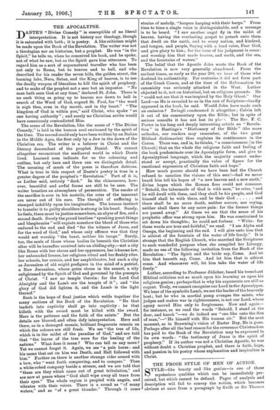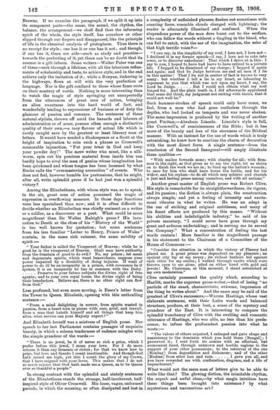THE PROSE STYLE OF MEN OF ACTION.
STYLE—like beauty and like genius—is one of those mysterious qualities which can be immediately per- ceived, but which cannot be defined. Pages of analysis and description will fail to convey the notion, which becomes obvious at once from a paragraph by Swift or Sir Thomas
Browne. If we examine the paragraph, if we split it up into its oomponent parts—the sense, the sound, the rhythm, the balance, the arrangement—we shall find that the informing spirit of the whole, the style itself, has somehow or other slipped through our fingers and disappeared, like the principle of life in the chemical analysis of protoplasm. Thus there is no receipt for style ; one has it or one has it not ; and though, if one has it, there are aids—such as study and practice— towards the perfecting of it, yet there can be no doubt that its essence is a gift inborn. Some writers—Walter Pater was one of them—seek through a lifetime, with all the laborious refine- ments of scholarship and taste, to achieve style, and in the end achieve only the imitation of it ; while a Bunyan, tinkering in the highways, flows at will with the very perfection of language. Nor is the gift confined to those whose fame rests on their mastery of words. Nothing is more interesting than to watch the magic of style springing out unexpectedly from the utterances of great men of action, bringing an alien sweetness into the hard world of fact, and wonderfully lending to expressions of business or of duty the glamour of passion and romance. The sentences of these natural stylists, thrown off amid the hazards and labours of administration or of arms, possess often enough a distinctive quality of their own,—a racy flavour of actual life which is rarely caught save by the greatest or least literary man of letters. It would have needed a Shakespeare or a Scott at the height of inspiration to coin such a phrase as Cromwell's memorable injunction, "Put your trust in God and keep your powder dry!" The mere writer who must, like a silk- worm, spin out his precious material from inside him can hardly hope to rival the man of genius whose imagination has been quickened and whose tongue has been loosened by what Burke calls the "overmastering necessities" of events. Who does not feel, however humble his pretensions, that he might, after all, write splendid prose if he had just won a splendid victory P Among the Elizabethans, with whom style was, so to speak, in the air, great men of action possessed the magic of expression in overflowing measure. In those days functions were less specialised than now ; and it is often difficult to decide whether an Elizabethan was chiefly eminent as a writer or a soldier, as a discoverer or a poet. What could be more magnificent than Sir Walter Raleigh's prose P His invo- cation to Death at the close of his "History of the World" is too well known for quotation; but some sentences from his less familiar "Letter to Henry, Prince of Wales" contain, in the same rich raiment, the same nobility of spirit
" Your father is called the Vicegerent of Heaven; while he is good he is the vicegerent of Heaven. Shall man have authority from the fountain of good to do evil P No, my prince ; let mean and degenerate spirits, which want benevolence, suppose your power impaired by a disability of doing injuries. If want of power to do ill be an incapacity in a prince, with reverence be it spoken, it is an incapacity he has in common with the Deity.
Preserve to your future subjects the divine right of free agents ; and to your own royal house the divine right of being their benefactors. Believe me, there is no other right can flow from God."
Less profound, but even more moving, is Essex's letter from the Tower to Queen Elizabeth, opening with this enthralling sentence :—
" From a mind delighting in sorrow, from spirits wasted in passion, from a heart torn in pieces with care, grief, and travail, from a man that hateth himself and all things that keep him alive, what service can your Majesty expect ?"
And Elizabeth herself was a mistress of English prose. Her
speech to her last Parliament contains passages of exquisite beauty, in which a solemn tenderness of cadence mingles with the simple grandeur of the words:—
" There is no jewel, be it of never so rich a price, which I prefer before this jewel, I mean your love. For I do more esteem it than any treasure or riches ; for that we know how to prize, but love and thanks I count inestimable. And though God bath raised me high, yet this I count the glory of my Crown, that I have reigned with your loves. This makes that I do not so much rejoice that God bath made me a Queen, as to be Queen over so thankful a people."
In strong contrast with the splendid and stately sentences of the Elizabethans stands the strange, half-incoherent, half- inspired style of Oliver Cromwell. His loose, vague, unformed periods, in which the meaning, so often dissipated and lost in a complexity of unfinished phrases, flashes out sometimes with
amazing force, resemble clouds charged with lightning the reader is alternately illumined and confused. When the stupendous power of the man does burst out to the surface, who can follow the words without a tingling in the blood, who
can fail to catch, with the ear of the imagination, the echo of that high terrific voice?—
" I can say, in the simplicity of my soul, I love not, I love not — I declined it in my former speech—I say, I love not to rake into sores, or to discever nakedness ! That which I drive at is this : I say to you, I hoped to have had leave to have retired to a private life. I begged to be dismissed of my charge;' I begged it agaifi and again; and God be Judge between me and all men if I lie in this matter! That I lie not in matter of fact is known to very many : but whether I tell a lie in my heart, as labouring to represent to you that which was not upon my heart, I say, the
Lord be Judge But I could not obtain what my soul longed for. And the plain truth is, I did afterwards apprehend that some did think, my judgment not suiting with theirs, that it could not well be."
Such hammer-strokes of speech could only have come, we feel, from a man who had gone scatheless through the
depths, who had looked on tempests and was never shaken. The same impression is produced by the writing of another great Puritan,—Abraham Lincoln. Lincoln's style is full, like Cromwell's, of reminiscences of the Bible ; but it has more of the beauty and less of the sternness of the Biblical manner. With an instinct for the use of words which is truly astonishing, he knew how to combine the charm of decoration
with the most direct force. A single sentence—from the conclusion of the Second Inaugural—will amply illustrate these qualities :—
"With malice towards none ; with charity for all; with firm,. ness in the right, as God gives us to see the right, let us strive on to finish the work we are in; to bind up the nation's wounds ; to care for him who shall have borne the battle, and for his widow, and his orphan—to do all which may achieve and cherish a just and lasting peace among ourselves, and with all nations."
Another great master of English prose was Robert Olive. His style is remarkable for its straightforwardness, its vigour, and its passion; the diction is always plain, the construction always simple; and yet a feeling of intensity and excite- ment vibrates in what he writes. He was an adept in the use of striking and original antitheses, and many of his finest effects are produced by this means. "Without his abilities and indefatigable industry," he said of his private secretary, "I could never have gone through my great and arduous undertaking ; and in serving me he served the Company." What a concentration of feeling the last words contain ! More familiar is the magnificent passage in his statement to the Chairman of a Committee of the House of Commons :—
"Consider the situation in which the victory of Plassey had placed me. A great prince was dependent on my pleasure ; an opulent city lay at my mercy ; its richest bankers bid against each other for my smiles; I walked through vaults which were thrown open to me alone, piled on either hand with gold and jewels ! Mr. Chairman, at this moment, I stand astonished at my own moderation."
Clive certainly possessed the quality which, according to Rezak marks the supreme prose-writer,—that of losing "no particle of the exact, characteristic, extreme, impression of the thing he writes about." And the same may be said of the greatest of Olive's successors,—Warren Hastings, whose vast elaborate sentences, with their Latin words and balanced structure, produce, at their best, a sense of the mystery and grandeur of the East. It is interesting to compare the splendid trenchancy of Clive with the swelling and romantic utterance of Hastings, who was able, no less than his prede-
cessor, to infuse the profoundest passion into what he wrote :—
"The valour of others acquired, I enlarged and gave shape and consistency to the dominion which you hold there [Bengal] ; I preserved it; I sent forth its armies with an effectual, but economical hand, through unknown and hostile regions to the suppOrt of your other possessions; to the retrieval of the one [Bombay] from degradation and dishonour; and. of the other [Madras] from utter loss and ruin I gave you all, and you have rewarded me with confiscation, disgrace, and a life of impeachment."
What would not the mere man of letters give to be able to write like that P The glowing diction, the inimitable rhythm, the superb and awful close,—by what magic intuition have these things been brought into existence. ? by whit mysterious and unconscious art ?





















































 Previous page
Previous page